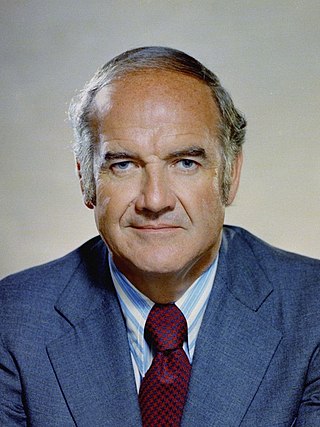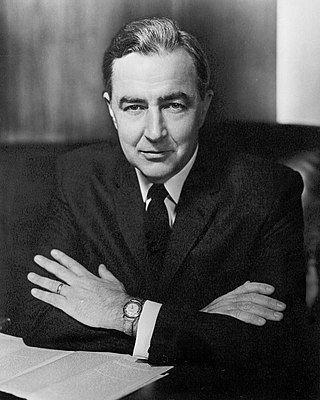
The 1964 United States presidential election was the 45th quadrennial presidential election. It was held on Tuesday, November 3, 1964. Incumbent Democratic President Lyndon B. Johnson defeated Senator Barry Goldwater, the Republican nominee, in a landslide. Johnson was the fourth and most recent vice-president to ascend to the presidency following the death of his predecessor and to win a full term in his own right. With 61.1% of the popular vote, Lyndon B. Johnson won the largest share of the popular vote for the Democratic Party in history, and the highest for any candidate since the advent of widespread popular elections in 1824.

The 1968 United States presidential election was the 46th quadrennial presidential election, held on Tuesday, November 5, 1968. The Republican nominee, former vice president Richard Nixon, defeated both the Democratic nominee, incumbent vice president Hubert Humphrey, and the American Independent Party nominee, former Alabama governor George Wallace. This was the last election until 1988 in which the incumbent president was not on the ballot. This was also the last election where a third-party candidate received an electoral vote.

Eugene Joseph McCarthy was an American politician, writer, and academic from Minnesota. He served in the United States House of Representatives from 1949 to 1959 and the United States Senate from 1959 to 1971. McCarthy sought the Democratic presidential nomination in the 1968 election, challenging incumbent Lyndon B. Johnson on an anti-Vietnam War platform. McCarthy unsuccessfully ran for U.S. president four more times.

Each of the 50 U.S. states, the District of Columbia, and territories of the United States holds either primary elections or caucuses to help nominate individual candidates for president of the United States. This process is designed to choose the candidates that will represent their political parties in the general election.

The New Hampshire presidential primary is the first in a series of nationwide party primary elections and the second party contest, the first being the Iowa caucuses, held in the United States every four years as part of the process of choosing the delegates to the Democratic and Republican national conventions which choose the party nominees for the presidential elections to be held in November. Although only a few delegates are chosen in the New Hampshire primary, its real importance comes from the massive media coverage it receives, along with the first caucus in Iowa.

The Dump Johnson movement was a movement within the United States Democratic Party to oppose the candidacy of President of the United States Lyndon B. Johnson to become the party's nominee in the 1968 presidential election. Their opposition to Johnson stemmed mainly from their opposition to the Vietnam War, while the movement can be seen as part of an internal battle within the Democratic Party between antiwar liberals, unreconstructed Cold Warriors and moderates.
A brokered convention, in US politics, can occur during a presidential election when a political party fails to choose a nominee on the first round of delegate voting at the party's nominating convention.
The Robert F. Kennedy presidential campaign began on March 16, 1968, when Robert Francis Kennedy, a United States Senator from New York, mounted an unlikely challenge to incumbent Democratic United States President Lyndon B. Johnson. Following an upset in the New Hampshire primary, Johnson announced on March 31 that he would not seek re-election. Kennedy still faced two rival candidates for the Democratic Party's presidential nomination: the leading challenger United States Senator Eugene McCarthy and Vice President Hubert Humphrey. Humphrey had entered the race after Johnson's withdrawal, but Kennedy and McCarthy remained the main challengers to the policies of the Johnson administration. During the spring of 1968, Kennedy led a leading campaign in presidential primary elections throughout the United States. Kennedy's campaign was especially active in Indiana, Nebraska, Oregon, South Dakota, California, and Washington, D.C. After declaring victory in the California primary on June 4, 1968, Kennedy was assassinated at the Ambassador Hotel in Los Angeles. He died on June 6, 1968 at Good Samaritan Hospital. Had Kennedy been elected president, he would have been the first brother of a former U.S. president to win the presidency himself.

From January 24 to June 20, 1972, voters of the Democratic Party chose its nominee for president in the 1972 United States presidential election. Senator George McGovern of South Dakota was selected as the nominee through a series of primary elections, caucuses, and state party conventions, culminating in the 1972 Democratic National Convention held from July 10 to July 13, 1972, in Miami, Florida.
The 1968 presidential campaign of Eugene McCarthy was launched by United States Senator Eugene McCarthy of Minnesota in the latter part of 1967 to vie for the 1968 Democratic Party nomination for president of the United States. The focus of his campaign was his support for a swift end to the Vietnam War through a withdrawal of American forces. The campaign appealed to youths who were tired of the establishment and dissatisfied with government.

From March to July 1968, Democratic Party voters elected delegates to the 1968 Democratic National Convention for the purpose of selecting the party's nominee for President in the upcoming election. After an inconclusive and tumultuous campaign focused on the Vietnam War and marred by the June assassination of Robert F. Kennedy, incumbent Vice President Hubert Humphrey was nominated at the 1968 Democratic National Convention held from August 26 to August 29, 1968, in Chicago, Illinois.

From January 3 to June 5, 2012, voters of the Democratic Party chose its nominee for president in the 2012 United States presidential election. President Barack Obama won the Democratic Party nomination by securing more than the required 2,383 delegates on April 3, 2012, after a series of primary elections and caucuses. He was formally nominated by the 2012 Democratic National Convention on September 5, 2012, in Charlotte, North Carolina.

Electoral history of Eugene McCarthy, United States Senator (1959–1971) and Representative (1949–1959) from Minnesota. He was a member of the Minnesota Democratic-Farmer-Labor Party.

The 1968 presidential campaign of Hubert Humphrey began when Vice President of the United States Hubert Humphrey of Minnesota decided to seek the Democratic Party nomination for President of the United States following President Lyndon B. Johnson's announcement ending his own bid for the nomination. Johnson withdrew after an unexpectedly strong challenge from anti-Vietnam War presidential candidate, Senator Eugene McCarthy of Minnesota, in the early Democratic primaries. McCarthy, along with Senator Robert F. Kennedy of New York, became Humphrey's main opponents for the nomination. Their "new politics" contrasted with Humphrey's "old politics" as the increasingly unpopular Vietnam War intensified.

The 1968 presidential campaign of Richard Nixon, the 36th vice president of the United States, began when Nixon, the Republican nominee of 1960, formally announced his candidacy, following a year's preparation and five years' political reorganization after defeats in the 1960 presidential election and the 1962 California gubernatorial election.

The 2008 United States presidential election in New Hampshire took place on November 4, 2008, as part of the 2008 United States presidential election throughout all 50 states and D.C. Voters chose four representatives, or electors to the Electoral College, who voted for president and vice president.

The 1968 United States presidential election in Illinois took place on November 5, 1968, as part of the overall 1968 United States presidential election. Illinois voters selected 26 electors to represent the state in the Electoral College, which would then choose the president and vice president.
The 1964 presidential campaign of Lyndon B. Johnson was a successful campaign for Johnson and his running mate Hubert Humphrey for their election as president and vice president of the United States. They defeated Republican presidential nominee Barry Goldwater and vice presidential nominee William Miller. Johnson, a Democrat and former vice president under John F. Kennedy was inaugurated as president upon Kennedy's assassination. In 1964, Johnson did not look optimistically upon the prospect of being elected president in his own right. Despite Johnson's uncertainty about running, he was seen as the most likely candidate to get the nomination. He entered the primaries starting with New Hampshire and won the state by almost 29,000 votes. Johnson's main opponent in the primaries was Alabama Governor George Wallace, who had announced his intention to seek the presidency even before Kennedy's assassination.
















